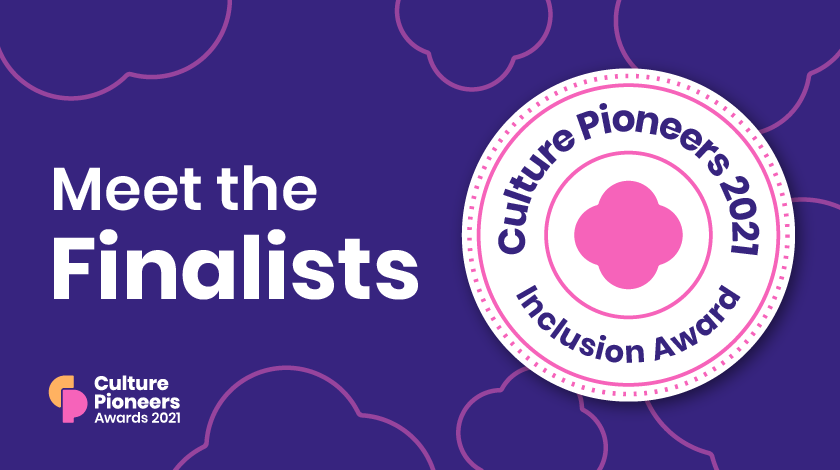While the pandemic has left many workforces feeling isolated and uncertain, inclusion has never been more important for employees. The entries for this year’s Culture Pioneer of Inclusion Award have shown that many organisations have gone above and beyond to make inclusion front and centre for their employees.
The current climate has drawn attention to the importance of welcoming diversity and true equality in the workplace. Organisations from all over have risen to meet the demands of employee inclusion, and our judges have been impressed with the level of dedication to inclusion from the entrants in this category.
Without further ado, here are the five finalists for the Culture Pioneer of Inclusion 2021 category, along with a small sample of the work and determination put in, making them well-deserving of the shortlist.
The winner will be announced at our virtual awards night on 18th November, so make sure you don’t miss this well-needed evening of celebration.
Use #CulturePioneers on our social channels to let us know which stories resonate or reflect your organisation’s initiatives and future plans.
Deryn McIntosh, RCI
With a span of influence covering Europe, the Middle East, Asia and Asia Pacific RCI has a truly diverse, multinational team that works collaboratively to develop a more inclusive culture. Its primary purpose is to create a sense of belonging – for all team members to feel valued and have a voice within a flexible, welcoming company.
Senior HR director Deryn McIntosh showed how RCI’s culture commitments are building trust, clear communication, celebrating all achievements, encouraging creativity and productivity by being flexible and recognising individual strengths.
Data was collected on its employees for Employment Equity Reporting to develop a four-year plan to achieve equity representation from the previously disadvantaged within the organisation.
Annual tracking and reporting ensure fair opportunities for promotion and recruitment exist. RCI undertakes yearly income differential reporting across gender and equity groups and rationale reporting for disparities.
RCI has reviewed its policies and practices, jobs descriptions, and recruitment strategy to ensure fair practice with no barriers or bias. It drove education around menopause, reviewed its management process and created ‘Stay Interviews’ to assess areas of inclusion to be addressed.
Karen Dobres, Lewes Football Club
After becoming community-owned, Lewes Football Club (LFC) was the first football club in the world to assign equal playing budgets, raising the women’s budget to match the men’s.
Elected co-director Karen Dobres shared how LFC worked hard against the sexism that pervades sport today by welcoming unwelcome women to the game and attracting sponsors who align their message.
LFC drew attention to the gender-based prize gap in the FA Cup when the men’s team won £3.6m and the women’s team £25K. They questioned why women play on the main pitch or get as much training kit, good quality coaches or decent hotels for away games. Lewes FC equal budget ensures that the women’s team are equal to the men’s in all of these areas.
LFC’s board achieved a mandate to resource men and women players equally. Its ‘Equality FC’ campaign featured footage of girls playing hard on the pitch and a male fan asking: ‘How do you tell your daughter she’s worth less than your son?’, explaining that Lewes was doing this so that no-one in the future would have to tell their daughters they were worth less than their brothers.
“Lewes Football Club tackled inclusion head on, a real game changer, not just for the players but for the industry by role modelling what is possible when willing to challenge the established order and mindsets,” says Culture Pioneers Judge Shakil Butt.
David Blackburn, Financial Services Compensation Scheme
In the wake of Black Lives Matter, Financial Services Compensation Scheme (FSCS) became a founding signatory of the Race at Work Charter, and offered structured development for Black employees to remove barriers to progression.
Chief People Officer David Blackburn explained how FSCS opened dialogues with its employees on neurodiversity, menopause and mental health whilst pushing for its representation targets at all levels of the organisation.
FSCS offered enhanced paternity leave and dependency pay of 20 weeks full pay to support carers and parents struggling in the pandemic. Employees also took back control over the working day, and learning and progression paths.
FSCS were named one of The Times Top 50 Employers for Women, Stonewall Diversity Champions, and a Disability Positive Employer and Mindful Employer. FSCS also rolled out unconscious bias training for all employees.
“We were impressed by the Financial Services Compensation Scheme’s linkage between EDI and their ambition of ‘Protecting the Future’,” said Culture Pioneers Judge Mac Alonge. “They demonstrated strong results, a clear articulation of activities undertaken and provided positive performance indicators of progress being made.”
Jessica Bensch and Sandra Simms, F. Homann-La Roche
F. Hoffmann-La Roche responded to changing needs in healthcare with its Agile Transformation Journey where it found that “having a company culture that is too ‘nice’ means truth-telling is driven underground at times.”
D&I COO Sandra Simms and transformation engagement partner Jessica Bensch shared how a colleague invited ten colleagues to speak candidly about their own workplace experiences, leading to 400+ people pledging to be bolder in everyday interactions. 50 joined the ’Culture Coalition: Humans of Roche’, speaking out and pushing cultural change, not only in the workplace but in other organisations as well.
“Roche demonstrated their clear intentions and took us on a journey complete with the ‘origin story’ for the Cultural Coalition,” said Culture Pioneers Judge Mac Alonge. “Comments from staff within the submission showed good evidence of staff understanding the role of the initiative, with encouraging initial levels of company wide engagement.”
Steph Clark, Hampshire Hospitals Foundation Trust
Hampshire Hospitals Foundation Trust (HHFT)’s staff survey highlighted how Black, Asian and minority ethnic staff had a vastly different work experience to white staff. In response, it used reverse mentoring to reverse the flow of knowledge and understanding between senior and lower levels of staff.
Minority groups mentored senior leaders on their experience of working in the organisation so the senior member can understand how the culture needs to change to become more inclusive. Shadowing sessions allowed circles of influence to be broadened and HR policies have changed to ensure BAME representation on interview panels.
OD consultant Steph Clark also spoke about the importance of celebrating diversity and inclusion. HHFT celebrates its different cultures by cooking and celebrating different cultural foods in its canteen, including a postcard of information on the cultural representation.






